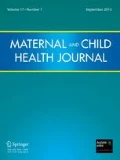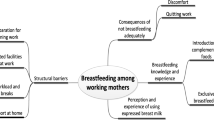Abstract
Objectives
Limited research has been conducted on the maternal and child health situation of garment factory workers in Cambodia. This qualitative study investigated the health-seeking behaviours for maternal and infant care of female garment factory workers in Kampong Tralach district, Cambodia.
Methods
We conducted 54 in-depth interviews, six focus group discussions and observed two factories. Participants were pregnant women and mothers of infants who have worked in factories, young women currently working in factories, caregivers of children, village leaders, healthcare workers, and factory managers. Deductive and inductive thematic analysis was performed.
Results
The women were accessing regular antenatal and facility-based delivery care. Most factory managers provided maternity leave, and some also provided leave for regular antenatal (ANC) visits. Women often returned to work 2 months post-delivery and this triggered the cessation of exclusive breastfeeding. Feeding was also compromised for the 6–12 months old children as carers, delayed the introduction of complementary feeds. Factories were equipped with childcare and breastfeeding spaces, however these were not used due to both feasibility issues and distrust of factory management. Instead, grandmothers were the preferred childcare providers.
Conclusions for Practice
Current factory policies regarding ANC, maternity leave and childcare provisions are context insensitive to rural workers who live far from the workplace to avail themselves of mandated ANC leave or breastfeeding breaks. Our study suggest that the increasing number of young women working in garment factories is compromising the early nutrition of their children, with a reduction in exclusive breastfeeding and inadequate complementary feeding.
Similar content being viewed by others
References
Cockroft, M. (2014). Literature review: Sexual and reproductive health and rights of migrant garment factory workers in Cambodia. Cambodia: UNFPA Phnom Penh.
Enfants & Development. (2015). Reproductive and maternal health of garment workers in Kampong Speu. Phnom Penh: Enfants & Development.
International Labour Organization. (2012). Action-oriented research on gender equality and the working and living conditions of garment factory workers in Cambodia. Phnom Penh: International Labour Organization.
International Labour Organization. (2015). Labour standards in global supply chains: A programme of action for Asia and the garment sector. Phnom Penh: Cambodia Garment and Footwear Sector Bulletin (1) ILO. https://www.ilo.org/wcmsp5/groups/public/---asia/---ro-bangkok/---sro-bangkok/documents/publication/wcms_383562.pdf. Accessed 12 June 2019.
Makurat, J., Friedrich, H., Kuong, K., Wieringa, F., Chamnan, C., & Krawinkel, M. (2016). Nutritional and micronutrient status of female workers in a garment factory in Cambodia. Nutrients, 8(11), 694.
National Institute of Statistics, Directorate General for Health, & ICF Macro. (2011). Cambodia demographic and health survey 2010. Phnom Penh: National Institute of Statistics, Directorate General for Health, & ICF Macro.
National Institute of Statistics, Directorate General for Health, & ICF Macro. (2015). 2014 Cambodia demographic and health survey key findings. Rockville, MD: National Institute of Statistics, Directorate General for Health, & ICF Macro.
Prak, S., Dahl, M., Oeurn, S., Conkle, J., Wise, A., & Laillou, A. (2014). Breastfeeding trends in Cambodia, and the increased use of breast-milk substitute—Why is it a danger? Nutrients, 6(7), 2920.
Sopheab, H. (2014). Baseline survey report: Reproductive, maternal and neonatal health knowledge, attitudes and practices among female garment factory workers in Phnom Penh and Kandal Provinces. National Institute of Public Health Phnom Penh, Cambodia
The World Bank. (2015a). Mortality rate, under-5 (per 1,000 live births). Retrieved from http://data.worldbank.org/indicator/SH.DYN.MORT?end=2015&start=2000.
The World Bank. (2015b). Maternal mortality ratio (modeled estimate, per 100,000 live births). Retrieved from http://data.worldbank.org/indicator/SH.STA.MMRT?end=2015&start=2000&view=chart.
UNICEF. (2009). Tracking progress on child and maternal nutrition—a survival and development priority. New York: UNICEF.
UN-Joint Programme for Children Food Security and Nutrition in Cambodia, & International Labour Organization. (2010). Women working in factories and maternal health-focus on the nutrition component. Phnom Penh: UN-Joint Programme for Children Food Security and Nutrition in Cambodia, & International Labour Organization.
Acknowledgements
We would like to thank the World Vision International Cambodia staff and partners, team members of the Health and Nutrition unit and IMNS project, Operations Health Technical Officers, and Operations Monitoring Officers for their support in the pre-test, field data collection, and data analysis. Appreciation goes to Mary Dunbar who advised on the study protocol, and National Ethical Committee for Health Research (NECHR) for approving the study implementation. We are also grateful to the IMNS project partners: Provincial Health Departments, Operational Health District and Village Health Support Groups. Finally, we would like to thank all the participants for sharing the valuable time to participate in this study.
Funding
This study was funded by World Vision International Cambodia.
Author information
Authors and Affiliations
Corresponding author
Ethics declarations
Ethical Approval
Ethical approval was obtained from the National Ethics Committee for Health Research, Cambodia.
Informed Consent
Informed consent prior to all interviews and FGDs were also provided by the participants. Participants were provided with a bar of soap as a form of appreciation and recognition of their time.
Additional information
Publisher's Note
Springer Nature remains neutral with regard to jurisdictional claims in published maps and institutional affiliations.
Rights and permissions
About this article
Cite this article
Jameel, A., Vong, L., Hun, V. et al. Early Childhood Nutritional Implications of the Rise in Factory Employed Mothers in Rural Cambodia: A Qualitative Study. Matern Child Health J 23, 1087–1097 (2019). https://doi.org/10.1007/s10995-019-02745-0
Published:
Issue Date:
DOI: https://doi.org/10.1007/s10995-019-02745-0




